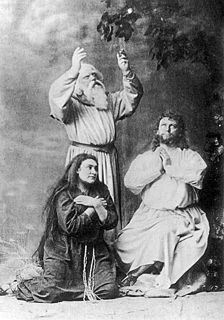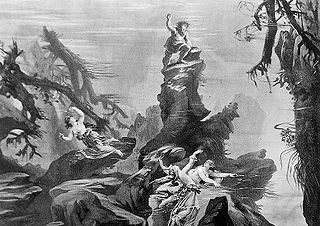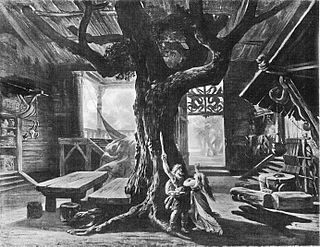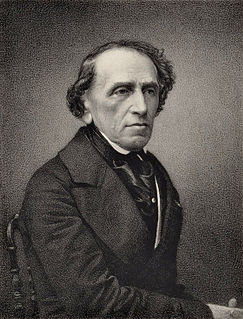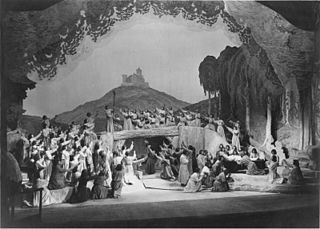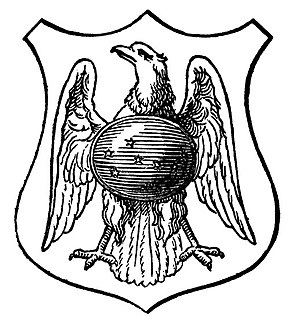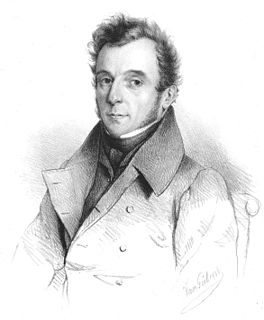
Polonia (WWV 39) is a concert overture written by Richard Wagner. Wagner completed Polonia in 1836, although it has been suggested that it may have been drafted as early as 1832. [1]
The Wagner-Werk-Verzeichnis, usually shortened to WWV, is an index and musicological guide to the 113 musical compositions and works for the stage of Richard Wagner compiled by John Deathridge, Martin Geck, and Egon Voss.

Wilhelm Richard Wagner was a German composer, theatre director, polemicist, and conductor who is chiefly known for his operas. Unlike most opera composers, Wagner wrote both the libretto and the music for each of his stage works. Initially establishing his reputation as a composer of works in the romantic vein of Carl Maria von Weber and Giacomo Meyerbeer, Wagner revolutionised opera through his concept of the Gesamtkunstwerk, by which he sought to synthesise the poetic, visual, musical and dramatic arts, with music subsidiary to drama. He described this vision in a series of essays published between 1849 and 1852. Wagner realised these ideas most fully in the first half of the four-opera cycle Der Ring des Nibelungen.
Wagner states that Polonia resulted from a "dreamlike evening" in Leipzig when he heard uninterrupted Polish songs, including the Polish national anthem Poland Is Not Yet Lost at a celebration of May 3rd Constitution Day in 1832. [2] He composed the work later in Berlin in May-July 1836, and gave its first performance in Königsberg the following winter. The work, which is in sonata form, contains references to Polish folksong. [3]

Leipzig is the most populous city in the federal state of Saxony, Germany. With a population of 581,980 inhabitants as of 2017, it is Germany's tenth most populous city. Leipzig is located about 160 kilometres (99 mi) southwest of Berlin at the confluence of the White Elster, Pleiße and Parthe rivers at the southern end of the North German Plain.
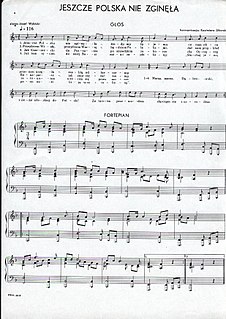
"Mazurek Dąbrowskiego", also known by its incipit, "Poland Is Not Yet Lost" ("Jeszcze Polska nie zginęła"), is the national anthem of Poland.
Wagner apparently took the manuscript of the score with him to Paris in 1839. He thought it had been lost during his visit, but it was returned to him by the conductor Jules Pasdeloup in 1869. [4] Discussing the overture with his wife Cosima on Christmas Day 1881, Wagner opined that "with a military band for the people, as I thought of everything at the time, it would have sounded splendid and made a great effect." [5]

Jules Étienne Pasdeloup was a French conductor.

Cosima Wagner was the illegitimate daughter of the Hungarian pianist and composer Franz Liszt and Marie d'Agoult. She became the second wife of the German composer Richard Wagner, and with him founded the Bayreuth Festival as a showcase for his stage works; after his death she devoted the rest of her life to the promotion of his music and philosophy. Commentators have recognised Cosima as the principal inspiration for Wagner's later works, particularly Parsifal.

A military band is a group of personnel that performs musical duties for military functions, usually for the armed forces. A typical military band consists mostly of wind and percussion instruments. The conductor of a band commonly bears the title of Bandmaster or Director of Music. Ottoman military bands are thought to be the oldest variety of military marching bands in the world, dating from the 13th century.
Wagner's biographer Ernest Newman wrote that the overture was "shapeless and frothy...the oddest mixture of a pseudo-Polish idiom and the cheap assertive melody of Rienzi ". [6] The writer Adrian Corleonis has commented that "Polonia 's coarse-grained excitement, which may at first seem audacious, looms as merely clumsy ... well before its run halfway through its dozen-minute course, the curious compulsion to revisit lame material having something about it of the boorish, drunken frat boy imagining that he's the life of the party". [7]
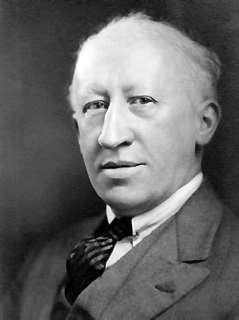
Ernest Newman was an English music critic and musicologist. Grove's Dictionary of Music and Musicians describes him as "the most celebrated British music critic in the first half of the 20th century." His style of criticism, aiming at intellectual objectivity in contrast to the more subjective approach of other critics, such as Neville Cardus, was reflected in his books on Richard Wagner, Hugo Wolf, Richard Strauss and others. He was music critic of The Sunday Times from 1920 until his death nearly forty years later.
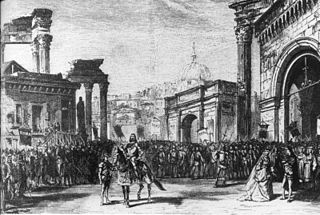
Rienzi, der letzte der Tribunen is an early opera by Richard Wagner in five acts, with the libretto written by the composer after Edward Bulwer-Lytton's novel of the same name (1835). The title is commonly shortened to Rienzi. Written between July 1838 and November 1840, it was first performed at the Königliches Hoftheater, Dresden, on 20 October 1842, and was the composer's first success.
The composer's manuscript of his piano arrangement of the score, which he made in 1840, is in the Stefan Zweig Collection at the British Library. Zweig acquired the manuscript from a dealer in Vienna in 1937. [8]

The Stefan Zweig Collection is an important collection of autograph manuscripts formed by the Austrian writer Stefan Zweig. After his death in 1942 his heirs continued to develop the collection, and donated it to the British Library in 1986. The collection includes a large number of literary and music manuscripts, mainly in the composers' own hands.

The British Library is the national library of the United Kingdom and the largest national library in the world by number of items catalogued. It is estimated to contain 150–200 million+ items from many countries. As a legal deposit library, the British Library receives copies of all books produced in the United Kingdom and Ireland, including a significant proportion of overseas titles distributed in the UK. The Library is a non-departmental public body sponsored by the Department for Culture, Media and Sport.
